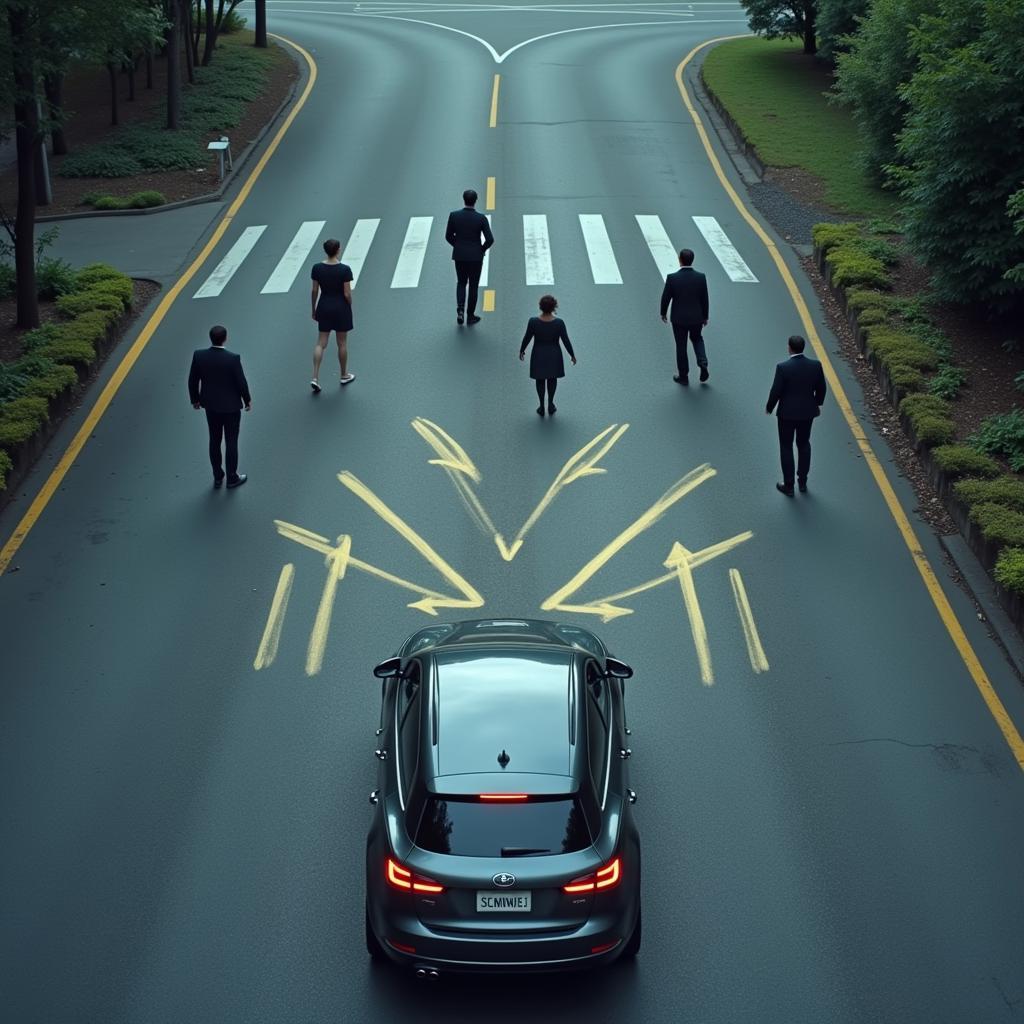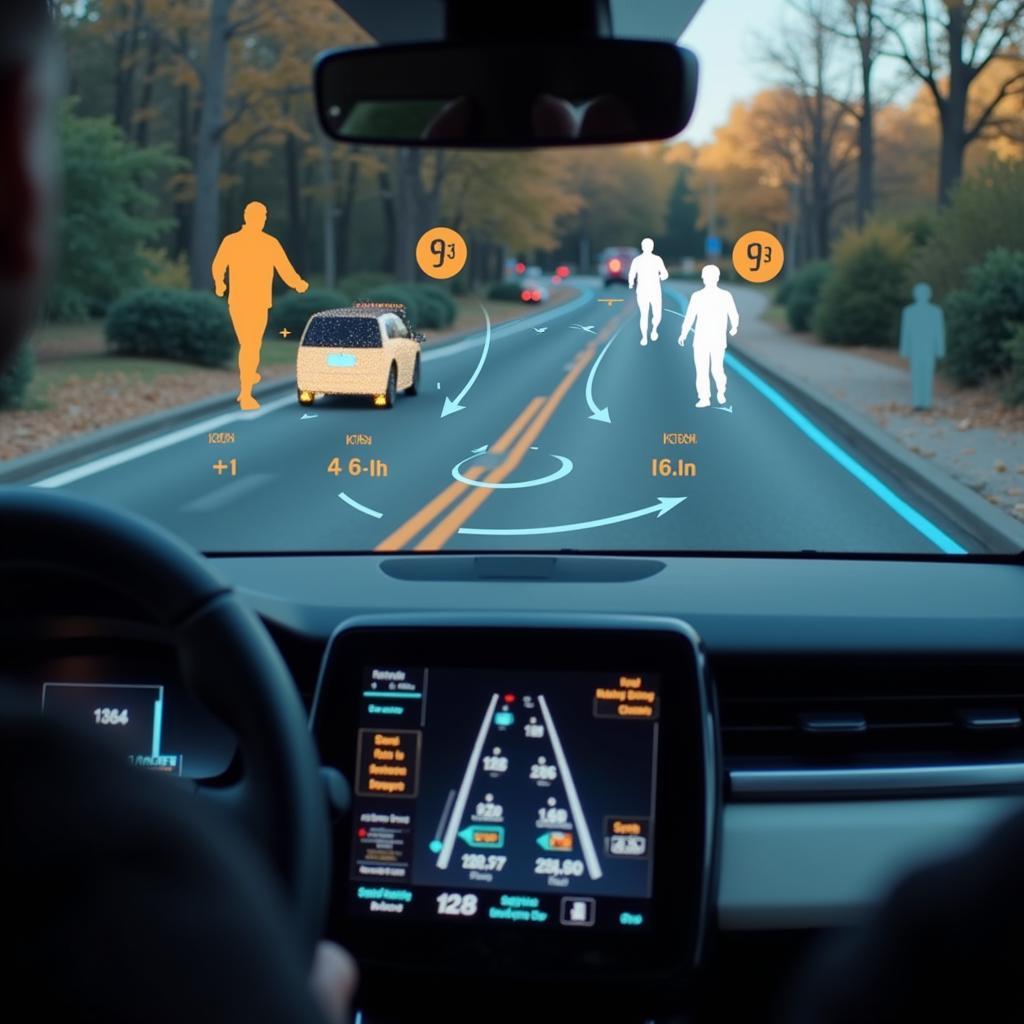The Autonomous Cars Trolley Problem has become a central ethical debate surrounding self-driving vehicles. What happens when a driverless car is faced with an unavoidable accident? How will these complex machines make decisions in life-or-death scenarios? This article delves into the nuances of this ethical challenge and explores potential solutions.
the trolley problem self driving cars
Understanding the Trolley Problem and its Implications for Self-Driving Cars
The classic trolley problem presents a thought experiment: a runaway trolley is headed towards five people tied to the tracks. You can pull a lever to divert the trolley onto a side track, where one person is tied. Do you sacrifice one life to save five? This philosophical dilemma has found a new, practical application with the advent of autonomous vehicles. How can we program a car to make such a decision? What ethical framework should guide its programming? These are critical questions that need answers as self-driving technology continues to evolve.
 Autonomous Car Facing a Trolley Problem Dilemma
Autonomous Car Facing a Trolley Problem Dilemma
Who’s Responsible? Legal and Ethical Considerations
The trolley problem also raises important legal and ethical questions about responsibility. If a self-driving car causes an accident, who is liable – the owner, the manufacturer, or the programmer? The complexities of assigning blame in these scenarios are yet to be fully untangled. Current legal frameworks are ill-equipped to handle the unique challenges presented by autonomous vehicle accidents, necessitating the development of new laws and regulations. Furthermore, societal acceptance of self-driving cars hinges on the public’s trust in the ethical decision-making capabilities of these vehicles.
How Will Autonomous Vehicles Handle the Trolley Problem in Reality?
While the philosophical trolley problem provides a useful framework, real-world scenarios are far more complex. Factors like reaction time, road conditions, and the unpredictable behavior of other drivers add layers of complexity. Current self-driving systems are primarily programmed to prioritize minimizing overall harm. However, quantifying “harm” and translating it into algorithms presents significant challenges. How can a car distinguish between a child and an adult, a pedestrian and a cyclist? These are just some of the complexities that engineers are grappling with.
“The challenge is not just about programming the ‘right’ answer, but about creating a system that can adapt to the infinite variations of real-world situations,” explains Dr. Emily Carter, a leading AI researcher in autonomous vehicle technology.
 Self-Driving Car Making an Ethical Decision
Self-Driving Car Making an Ethical Decision
Exploring Potential Solutions: Algorithms and Ethical Frameworks
Several approaches are being explored to address the trolley problem in self-driving cars. Utilitarianism, which focuses on maximizing overall well-being, is a common framework. However, other ethical theories, like deontology, which emphasizes moral duties and rights, also offer valuable perspectives. Machine learning algorithms can be trained on vast datasets of accident scenarios to learn and improve their decision-making capabilities. Furthermore, public consultations and ethical guidelines can help shape the development and deployment of these technologies.
what are problems with driverless cars
What Will the Future Hold? Public Perception and Acceptance
Public perception plays a crucial role in the future of autonomous vehicles. People need to feel safe and trust the technology before they are willing to relinquish control of the steering wheel. Transparency in how these vehicles make decisions is vital to building public trust. “Open communication about the ethical considerations and decision-making processes of self-driving cars is essential for fostering public acceptance,” states Dr. Michael Davis, a renowned ethicist specializing in autonomous vehicle technology.
what will driverless cars do in a trolley problem
Conclusion: The autonomous cars trolley problem is a multifaceted challenge that requires careful consideration. As self-driving technology advances, it is imperative that we develop ethical frameworks, legal regulations, and technical solutions that prioritize safety, fairness, and transparency.
how self-driving cars will solve the ethical trolley problem
Need assistance with your car? Contact AutoTipPro at +1 (641) 206-8880 or visit our office at 500 N St Mary’s St, San Antonio, TX 78205, United States. We’re here to help!




Leave a Reply